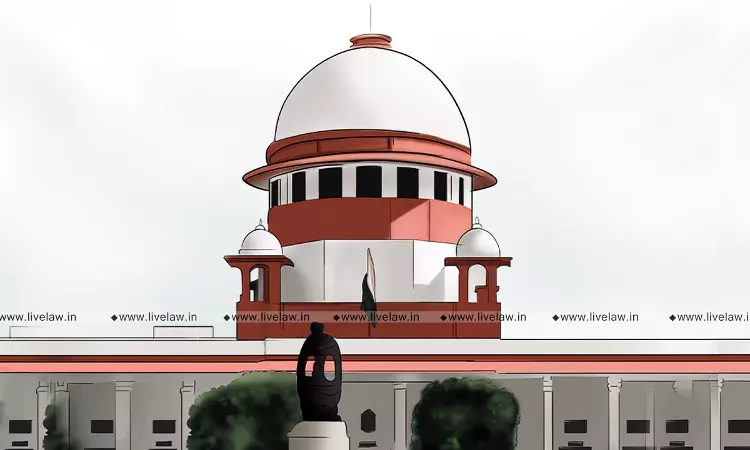- Home
- /
- Top Stories
- /
- Customs Act | Provisional Release...
Customs Act | Provisional Release Of Seized Object Won't Extend Timelimit For Issuing Show Cause Notice In Pre-2018 Cases : Supreme Court
Amisha Shrivastava
18 Sept 2025 8:34 PM IST
The Supreme Court recently upheld a Delhi High Court order directing release of an imported Maserati car seized by the Directorate of Revenue Intelligence (DRI), upholding the HC's view that failure to issue a show-cause notice within time prescribed under the Customs Act, 1962 entitles the person to release of the seized goods.A bench of Justice JB Pardiwala and Justice Sandeep Mehta...
The Supreme Court recently upheld a Delhi High Court order directing release of an imported Maserati car seized by the Directorate of Revenue Intelligence (DRI), upholding the HC's view that failure to issue a show-cause notice within time prescribed under the Customs Act, 1962 entitles the person to release of the seized goods.
A bench of Justice JB Pardiwala and Justice Sandeep Mehta further held that provisional release of seized goods under Section 110A of the Customs Act does not stop the operation of Section 110(2), which mandates issuance of a show-cause notice within six months of the seizure.
“The Delhi High Court is right in saying that any effort to say that the release under Section 110A of the Act, 1962 would extinguish the operation of the consequence of not issuing show-cause notice within the statutory period spelt out in Section 110(2) would be contrary to the plain meaning and intendment of the statute”, the Court stated.
The Court pointed out that this position changed in 2018, after the insertion of the second proviso to Section 110(2), which exempts provisional release cases from the time limit. However, the present matter involved seizure made before the amendment.
The case involved seizure of a brand-new Maserati Quattroporte 4.2 Automatic car on December 7, 2010, imported by one Jatin Ahuja, who trades in luxury cars.
The DRI detained the car on the same day under Section 110 of the Customs Act, which empowers customs officers to seize goods believed to be liable to confiscation. It handed the vehicle back to Ahuja the same day on supurdarinama (custody undertaking).
Section 124(a) of the act requires the customs authorities to issue a show-cause notice before confiscating goods or imposing a penalty.
Section 110(2) provides that when goods are seized under section 110(1), and no notice is given under Section 124(a) within six months of the seizure, the goods shall be returned to the person from whose possession they were seized. The Commissioner of Customs can extend this period by six months after giving reasons.
Almost a year after the seizure, on October 24, 2011, the Commissioner of Customs extended the period for issuance of show-cause notice by six months with effect from October 25, 2011. On May 9, 2012, the DRI cancelled the supurdarinama and took possession of the Maserati.
Before the Delhi High Court, Ahuja argued that upon expiry of the period of one year from the date of seizure of the car, he was entitled to an unconditional release of the same.
The DRI relied on Bombay High Court's judgment in Jayant Hansraj Shah v. Union of India and contended that since the car was provisionally released under Section 110A of the Act on May 09, 2012, the period during which the car was provisionally released under Section should be excluded from calculating the limitation prescribed under Section 110(2).
The Delhi High Court allowed Ahuja's writ petition, holding that non-issuance of a show-cause notice within the prescribed time under Section 110(2) of the Act entitled him to release of the car, as the seizure had lapsed.
The Supreme Court disagreed with the Bombay High Court's view in Jayant Hansraj Shah v. Union of India. It noted that the only power to extend the time period is under the first proviso to Section 110(2) of the Act.
The Supreme Court agreed with the Delhi High Court's view that release under Section 110A, which permits provisional release of seized goods, does not remove the consequence of failing to issue a show-cause notice within the period prescribed in Section 110(2).
The Court observed that Section 110A functions as an interim arrangement to allow release of goods, including perishable or fast-moving items, but does not in any way impede or limit the mandatory time limit in Section 110(2).
“We find that in respect of the seized car, there is neither any notice under clause (a) of section 124 issued to the respondent within six months of the seizure nor the period of six months ever came to be extended for a further period of six months. In the absence of there being any notice as required by the first proviso even within the extended period upto one year, the consequence that ought to follow is release of the seized car”, the Court concluded.
Thus, the Supreme Court dismissed DRI's appeal, along with ten other appeals filed by DRI involving the same legal issues, and allowed two appeals filed by assessees against a Bombay High Court judgment which supported the DRI's stand.
Case no. – Civil Appeal No. 3489 of 2024
Case Title – Union of India & Ors. v. Jatin Ahuja and connected cases
Citation : 2025 LiveLaw (SC) 922



